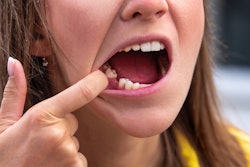Intermittent fasting -- an eating pattern cycling between periods of eating and fasting -- may help soothe gum inflammation and improve other health markers even when oral hygiene is subpar. The research was presented on May 12 at EuroPerio 11 in Vienna.
A study compared a regular, nonfasting diet with two time-restricted diets and found that both fasting diets not only reduced gum inflammation but improved weight, blood sugar levels, and indicators of systemic inflammation.
“The reductions we observed in inflammation-related markers and gingival parameters suggest that fasting could eventually become part of dietary guidance for patients interested in supporting their oral health through lifestyle choices,” wrote the researchers, led by Christina Laetitia Pappe of Charité Universitätsmedizin Berlin in Germany.
The study comprised 66 healthy adult nonsmokers with no history of gum disease or health problems who were assigned to one of three diets:
- A nonfasting diet with no eating restrictions
- A time-restricted eating (TRE) diet in which study participants fasted for 16 hours and then ate during an eight-hour period
- Baha’i fasting in which people did not eat or drink from sunrise to sunset
To induce a mild inflammatory response, study participants were told not to brush or floss certain areas of their mouth for nine days while following their assigned diet. The main outcome measured was bleeding on probing (BOP), a sign of gum inflammation.
Following the nine days, BOP increased 14.9% in the control, nonfasting group; 14.6% in the TRE group; and 5.4% in the Baha’i group. Gingival crevicular fluid increased in the control group but did not in either of the groups that fasted.
After 19 days, patients in both fasting groups had lower body weights and improved glucose levels. The Baha’i group had lower blood pressure and levels of C-reactive protein, a marker for systemic inflammation.
This latest research adds to other studies that fasting may reduce gum inflammation while boosting other health markers. But before any clinical recommendations can be made, more studies are needed.
This study had limitations, including that it was short in duration and Baha’i participants were not randomly assigned.
“This study provides early evidence that fasting may dampen inflammatory responses in the gums, which could have important implications for overall oral health and disease prevention,” researchers said. “While oral hygiene (flossing and brushing) remains the cornerstone of periodontal care, our findings suggest that diet -- particularly fasting protocols -- might complement existing prevention strategies.”



















